WWF-Philippines, CREST Assist in Public Rollout of Green Energy Option Program
April 2021
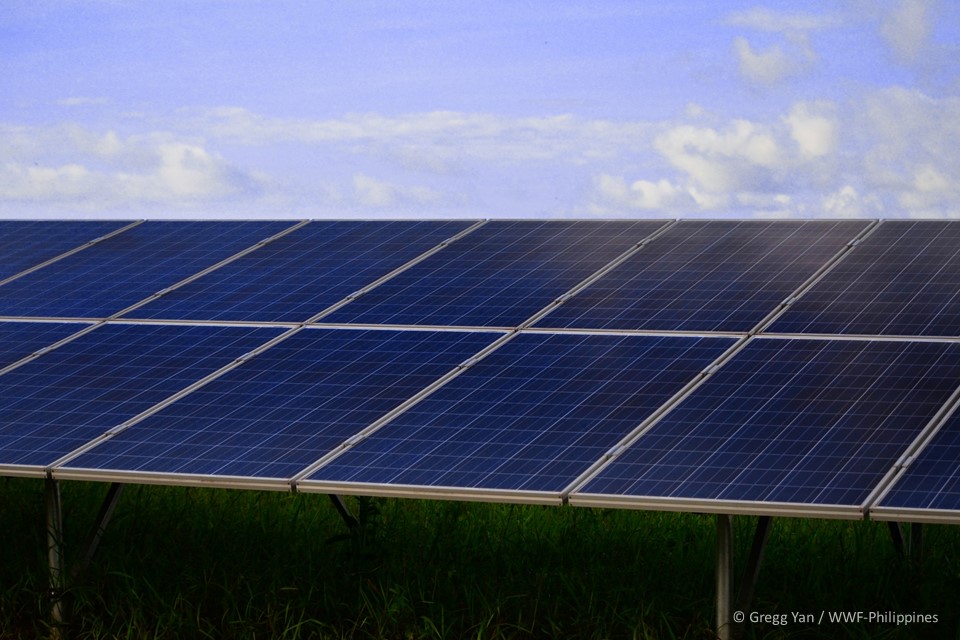
A row of solar panels. The Green Energy Option Program (GEOP), now open to consumers with monthly power usage of over 100 kilowatts, is a mechanism to allow the public to participate in the promotion of renewable energy. Photograph © Gregg Yan / WWF-Philippines
15 April 2021, Manila, Philippines - The World Wide Fund for Nature (WWF) Philippines, together with the Center for Renewable Energy and Sustainable Technology (CREST), organized a series of virtual dialogues with energy stakeholders in March to discuss the different non-fiscal mechanisms being implemented as part of the country’s Renewable Energy transition.
As the share of renewable energy in the country’s power generation mix dropped from 26.31% in 2010 to 20.79% in 2019, according to the Department of Energy - Renewable Energy Management Bureau (DOE-REMB), a big push for utilisation and expansion of renewable energy will be required to achieve the 2030 goal of having 35% of the country’s power coming from renewable energy. The Green Energy Option Program (GEOP), together with the renewable portfolio standards (RPS) and amended net-metering rules, create an environment that helps renewable energy flourish in the country while allowing the public to act as a driver for its expansion.
“After 12 years, the various RE mechanisms - such as the GEOP, RPS, and RE Market - are now ready to be rolled-out. The awareness and support coming from our distribution utilities, from the industry and from end-users is crucial to ensure the success of these mechanisms,” said CREST President Riedo Panaligan.
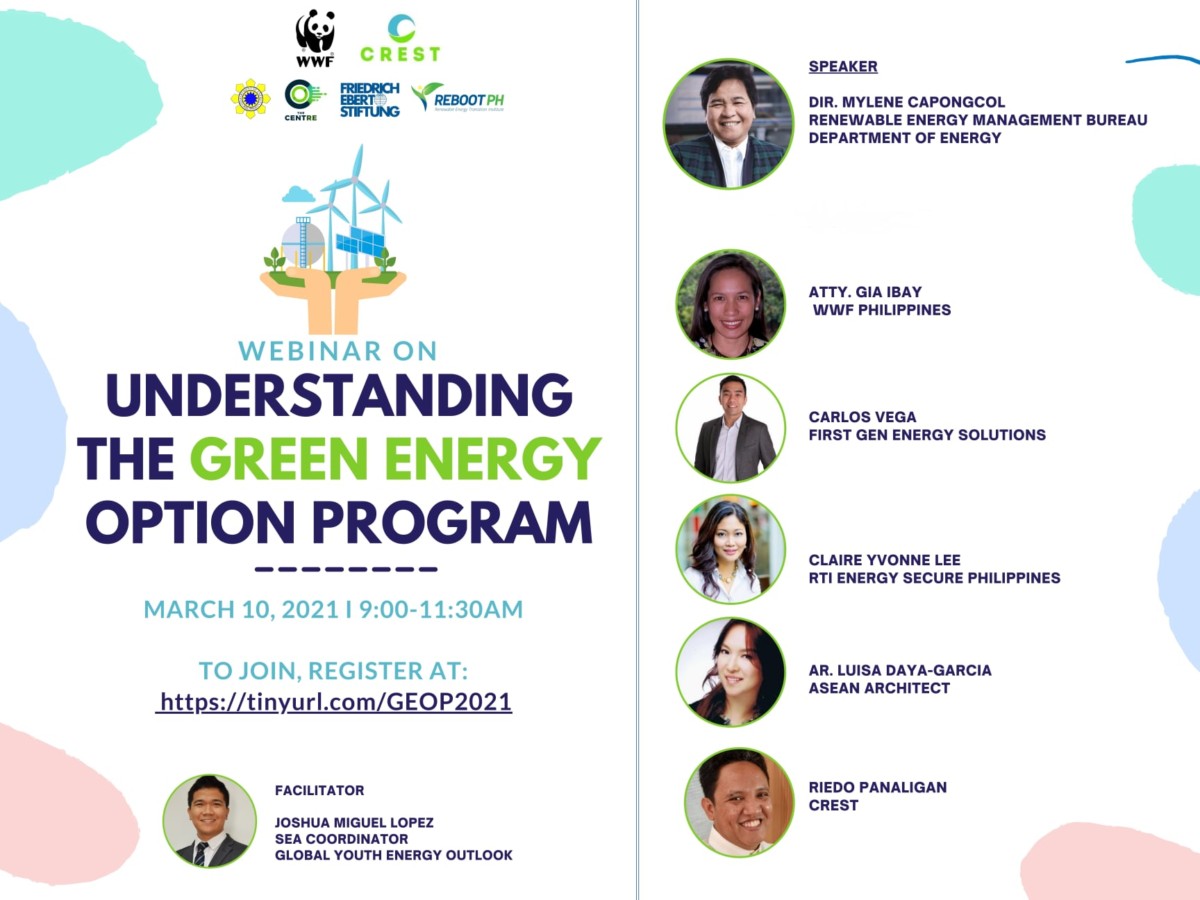
The first webinar, “Understanding the Green Energy Option Program,” was held to familiarize consumers with the GEOP. Photograph © CREST
The first webinar, “Understanding the Green Energy Option Program” held last March 10, gave an overview of the program to the public, with the DOE-REMB Director Mylene Capongcol as the main speaker, followed by a panel of reactors from First Gen Energy Solutions (VP Carlos Lorenzo Vega), Energy Secure Philippines (Ms. Claire Yvonne Lee), Green Architecture Advocacy of the Philippines (Arch. Luisa Daya-Garcia), and Global Youth Energy Outlook Southeast Asia Coordinator Mr. Joshua Miguel Lopez ably moderating the webinars. Under the Renewable Energy Act of 2008, the GEOP allows end users with a monthly power usage of over 100 kilowatts to purchase their energy directly from RE sources, with the goal of pushing public demand for a nationwide transition toward green energy.
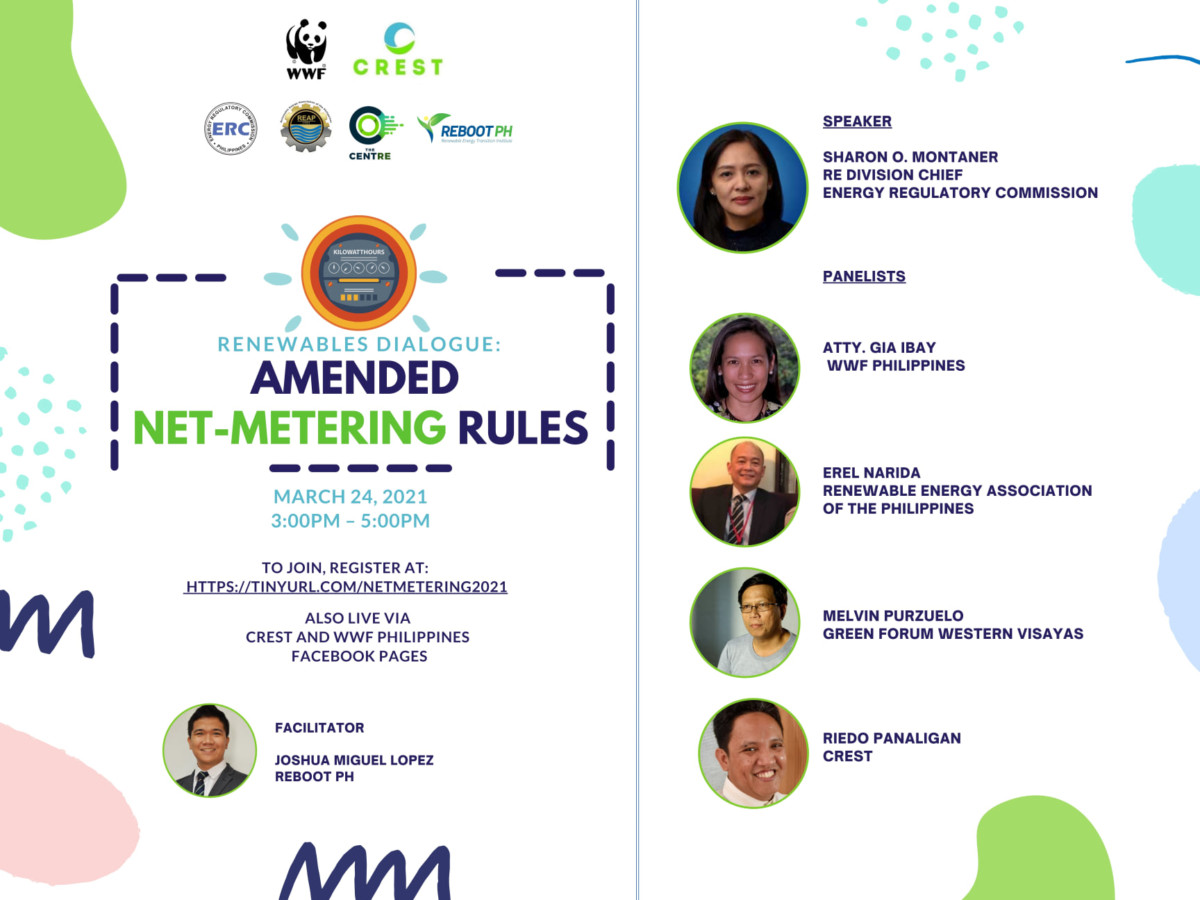
A follow-up webinar, “RE Dialogue: Amended Net-Metering Rules,” walked the public through the latest changes made to the Energy Regulatory Commission’s net-metering policy. Photograph © CREST
A follow-up webinar, “RE Dialogue: Amended Net-Metering Rules” held on March 24, clarified the recent amendments made to the net-metering program by the Energy Regulatory Commission (ERC), with ERC Market Operations Service Director Ms. Sharon Montañer delving into the experiences learned in the implementation of the earlier rules, and the new amendments aiming to address the barriers to net metering. Reactors included the General Manager of Agusan del Norte Electric Cooperative (ANECO) Engr. Darwin Daymiel, the President of the Renewable Energy Association of the Philippines (REAP) Mr. Erel Narida, and the Principal Coordinator of the Renewables of Green Forum Western Visayas, Engr. Melvin Purzuelo.
The net-metering policy allows consumers to construct their own on-site sources of renewable energy - solar panels on roofs or in front yards, for example - in order to generate their own electricity. Excess electricity generated by consumers can then be sold back to their distributor in exchange for peso credits, which can then be used to lower their bills. The ERC first issued its Resolution adopting the net-metering rules in 2013. In 2019, the net-metering process was streamlined and certain fees and soft costs were dropped, in order to make the policy more appealing to consumers.
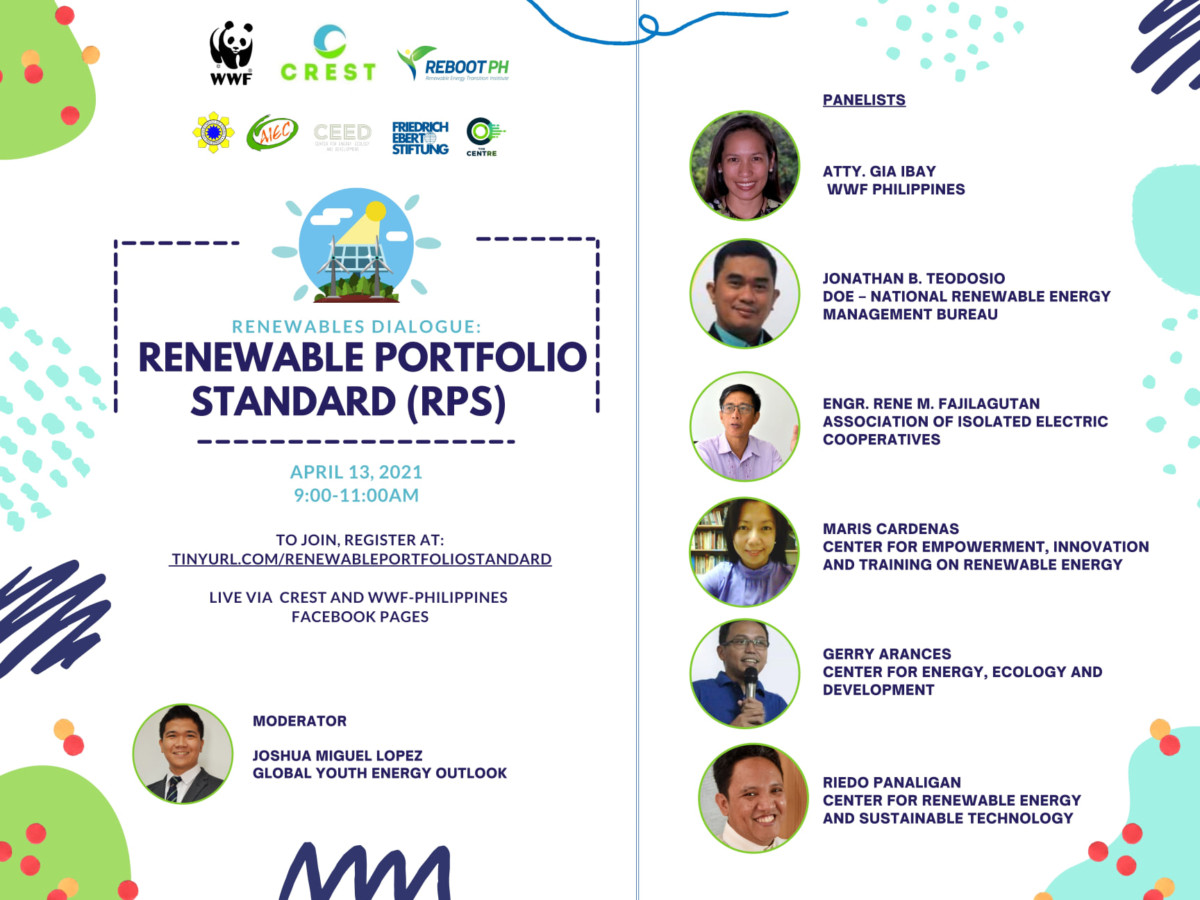
A third webinar, “Renewable Portfolio Standard (RPS),” discussed the DOE’s policy requiring suppliers source at least 1% of their electricity from renewable sources. The DOE plans to increase this requirement to 2.52% by 2022. Photograph © CREST
A third webinar, “Renewable Portfolio Standards” held last March 14, discussed the portfolio requirements outlined in the DOE’s circulars, DC 2017-12-0015: RPS On-Grid Rules and DC 2018-08-0024: RPS Off-Grid Rules. The RPS requires suppliers to source at least 1% of their electricity from renewable sources, in order to drive the utilization of RE in the country. This is set to increase from 1% to 2.52% by 2022 as more sources become available. The deep dive session involved speakers and reactors from Mr. Jonathan Teodosio (DOE-REMB), Engr. Rene Fajilagutan (President, Association of Island Electric Cooperatives, Inc.), Ms. Maris Crdenas (Executive Director, CentRE), and Mr. Gerry Arances (Executive Director, Center for Energy, Ecology, and Development)
Clamor over the need for a green energy transition has grown as the deadline for the Sustainable Development Goals loom closer. Nine years remain on what has been dubbed the “Decade of Action,” in which governments have been urged to ramp up their commitments to pressing issues such as poverty and climate change.
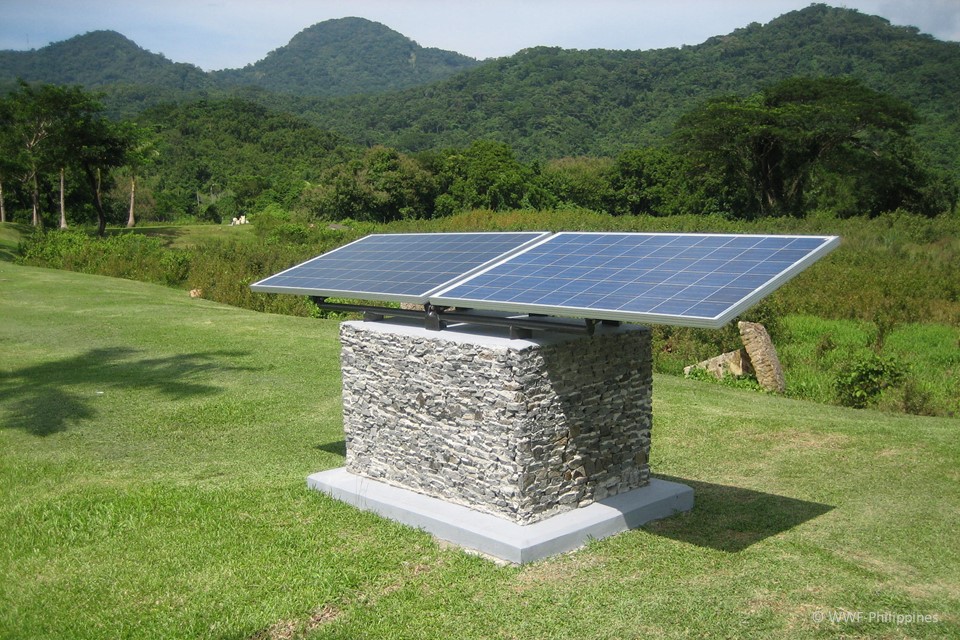
The Green Energy Option Program, together with the net-metering policy of the Energy Regulatory Commission, will create an environment that allows renewable energy to flourish in the Philippines. Photograph © WWF-Philippines
The Philippine government hopes to increase the share of renewable energy in the national power supply from 29% to 35% by the year 2030. WWF-Philippines is working to develop the country’s RE capacities, with programs like the REpowering Asia and Financing and Integrating Renewable Energy in Butuan City (FInRE-BXU) projects looking to finance and develop local sources of sustainable energy.
“It’s the hope of WWF-Philippines and of CREST that we can lay out the GEOP, and the other RE support mechanisms, in a way that is easy for everyone to understand and adopt. There are many important players in the transition toward renewables, and the public is part of that. The GEOP is a way for everyone to participate in building a clean energy future for our country,” said WWF-Philippines Climate and Energy Head Atty. Angela Ibay.
New avenues of public participation have opened up in the fight against climate change. With mechanisms like the GEOP in place, the Philippines is ramping up its transition toward a clean energy future.
For more information, please contact:
Atty. Gia Ibay
Climate and Energy Programme Head
gibay@wwf.org.ph
For media arrangements, please contact:
Ms. Chezka Guevarra
Public Relations, Media, and Events Assistant Manager
cguevarra@wwf.org.ph
Ms. Angelica Pago
Integrated Communications Manager
apago@wwf.org.ph
